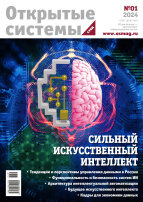_300x.jpg)
COVER FEATURE
ARTIFICIAL GENERAL INTELLIGENCE
Prospects of Creating general intelligence
Large language models like ChatGPT have developed up to a point where machine-generated content is virtually impossible to discern from human-created content. Increasingly, there is talk about creating a “strong”, or human-like artificial general intelligence in the nearest future.
Boris Slavin (bbslavin@fa.ru), Professor, Financial University under the Government of the Russian Federation (Moscow).
Data Quality Underpins AI Systems Functionality and Security
Expanding areas of AI systems’ use lend ever more importance to the challenge of ensuring functional correctness and security of those solutions, which is especially critical for high-stakes verticals. What is the impact of data quality on functionality and security characteristics of AI systems?
Sergei Garbuk (garbuk@list.ru), Science Project Director at National Research University Higher School of Economics (Moscow), and Chair of Artificial Intelligence Technical Committee 164 (Moscow).
PLATFORMS
CPUs with High-Bandwidth Memory: Should They Be Used Instead of GPUs or With Them?
Server processors design and manufacturing undergo radical changes these days: ever more cores, using GPUs for AI and high performance computing tasks, employing new data formats. The Xeon Max CPU with HBM2E memory is a typical member of the new-era server processor generation.
Mikhail Kuzminsky (kus@free.net), senior fellow, N.D. Zelinsky Institute of Organic Chemistry (Moscow).
Intelligent Automation is More Than Just RPA
Businesses that use RPA have rapidly achieved benefits promised by software robots. Still, comprehensive automation of end-to-end business processes requires solutions that involve more complex technologies.
Ivan Melnikov (Ivan.Melnikov@slsoft.ru), ROBIN Product Manager, SL Soft (Moscow).
DATA QUALITY
Component-Based Approach to Data Quality
Purchasing all kinds of data quality management tools, determining product KPIs, and tuning-up individual quality control procedures may not bring desired business outcomes unless end-to-end quality assurance is implemented. A component-based approach allows for various processes’ integration, data provenance tracking, and quality issues elimination.
Oksana Soldatova (OSoldatova@datatech.ru), Data Management Consultant, Datatech (Moscow).
DATA MANAGEMENT
Data Management Development in Russia: Drivers and Directions
Data management methodologies and technologies are currently on the rise in Russia, helped on the one hand by the demands of the data economy, and on the other, by emerging market niches previously taken by foreign IT players. What are the current trends in the Russian data management industry and what could be said about its future development? Leading market members share their views on the fate of the industry.
Mikhail Zyrianov (mikez@osp.ru), Editorial Director, OSP.RU (Moscow).
OS MEETING ROOM
Engineering Data Management at SIBUR Digital: Quality Data for Mega Projects
At present, vertically integrated manufacturing companies cannot operate without an information system collecting and integrating engineering data from company facilities across their entire lifecycle. The quality and reuse ability of the data play a direct role in the business success of a company.
Nikolai Smirnov (nsmirnov@osp.ru), freelance writer (Moscow).
OS ACADEMY
Semantic Message Filtering
It is important to do semantic data filtering when receiving text messages from open-access Internet sources. However, the large information volume makes manual filtering impossible. The article discusses the use of advanced text data analysis tools for semantic filtering. It also gives an overview of the current situation in the NLP (Natural Language Processing) sphere.
Ivan Yu. Pikalov (pikalov@kursksu.ru), Head of Center for Information Systems Development and Data Analysis, Kursk State University (Kursk).
Software Package for Automated Collection and Systematization of Scientific Publications
A software package enabling automated collection, receipt, and systematization of publications consists of a set of tools and software modules for collecting, analyzing and storing information. It includes tools for processing large volumes of data, working with databases, and much more. Automated collection of publication metadata is very important for digital repositories, as it allows information about publications to be automatically collected and structured, making it easier to find and use. In addition, it can collect information about publications faster and more accurately than can be done manually. It also helps improve data quality while saving time and resources. This article presents an algorithm for the operation of a software package that performs automated collection and systematization of scientific publications for the JINR digital repository.
Andrey Kondratyev (kondratyev@jinr.ru), Aleksey Bondyakov (aleksey@jinr.ru), software engineers, Joint Institute for Nuclear Research (Dubna).
Data Economy Talent Pool
The data economy requires hundreds of thousands of data professionals. In 2024 alone, to keep the Russian data industry growth rates afloat, the country would need over 300,000 software analysts and developers, database and networking professionals, business unit managers, engineers, and other specialists.
Russia’s Big Data Association has rolled out its FIT Academy Russia program aimed at training data management professionals using world-class standards.
Nikolai Smirnov (nsmirnov@osp.ru), freelance writer (Moscow).
OS LIBRARY
A million years in programming
The National Open University "INTUIT" has published a book on the history of the creation of programming languages.
Dmitry Volkov (vlk@keldysh.ru), Senior Research Fellow, M. V. Keldysh Institute of Applied Mathematics (Moscow).
The Tool for a Data Economy
Dmitry Volkov (vlk@keldysh.ru), Senior Research Fellow, M. V. Keldysh Institute of Applied Mathematics (Moscow).
